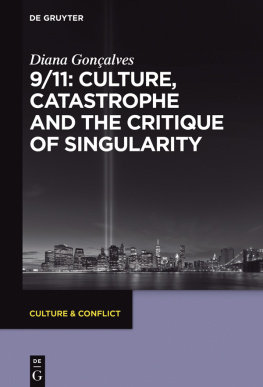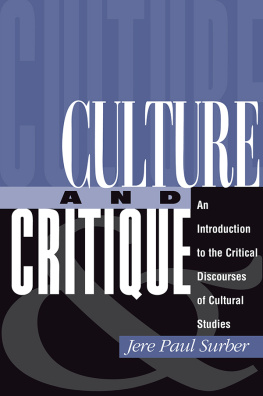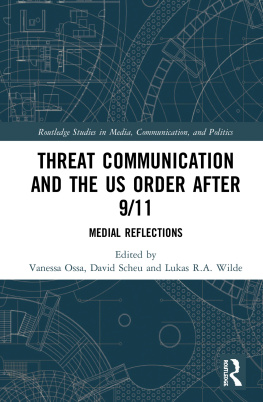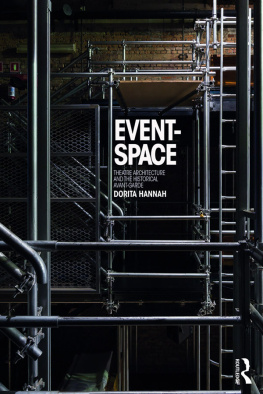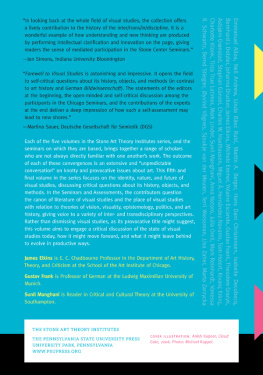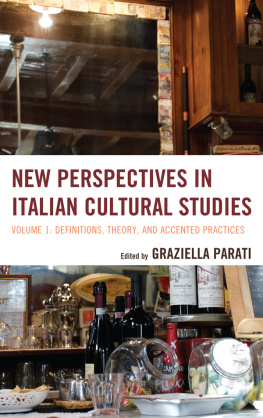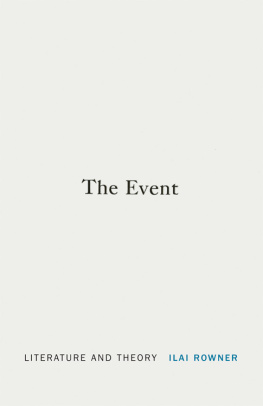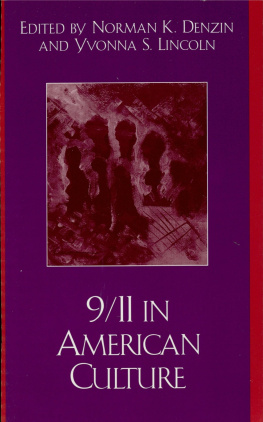Guide

Diana Gonalves
9/11: Culture, Catastrophe and the Critique of Singularity
Culture & Conflict
Edited by
Isabel Capeloa Gil and Catherine Nesci
Editorial Board
Arjun Appadurai Claudia Benthien Elisabeth Bronfen Joyce GogginLawrence Grossberg Andreas Huyssen Ansgar Nnning Naomi SegalMrcio Seligmann-Silva Antnio Sousa Ribeiro Roberto VecchiSamuel Weber Liliane Weissberg Christoph Wulf
Volume 9

ISBN 978-3-11-047313-1
e-ISBN (PDF) 978-3-11-047768-9
e-ISBN (EPUB) 978-3-11-047724-5
ISSN 2194-7104
Library of Congress Cataloging-in-Publication Data
A CIP catalog record for this book has been applied for at the Library of Congress.
Bibliographic information published by the Deutsche Nationalbibliothek
The Deutsche Nationalbibliothek lists this publication in the Deutsche Nationalbibliografie; detailed bibliographic data are available on the Internet at http://dnb.dnb.de.
2016 Walter de Gruyter GmbH, Berlin/Boston
Cover image: Andrea_Todaro/iStock/Thinkstock
Typesetting: Konrad Triltsch GmbH, Ochsenfurt-Hohestadt
www.degruyter.com
Acknowledgments
The journey that now comes to an end has been an extremely strenuous process, albeit very rewarding. The topic explored in this work has been in my head for a long time but the desire to explore it never faded (quite the contrary, in fact). When I finally started my PhD in Culture Studies, I completely embraced it. I knew I wanted to keep developing research on American Culture and 9/11, such an important event in recent history, presented itself as the perfect object of study.
As many have claimed before me in analogous situations, reaching this point could not have been possible without help from a network of people who I am profoundly indebted to. Without them, this work would have never been made into a book my first book.
First of all, I would like to express my deepest gratitude to my PhD supervisors, Professor Isabel Capeloa Gil (who I have known since my BA and who has truly been a huge ally throughout this whole endeavor) and Professor Ansgar Nnning, for their much-needed guidance. I would also like to thank Universidade Catlica Portuguesa, namely the School of Human Sciences, the Lisbon Consortium and the Research Centre for Communication and Culture (CECC), as well as the Justus Liebig University Giessen and the European PhDnet in Literary and Cultural Studies. My investigation benefited enormously from the opportunity to have other scholars and colleagues sharing their insights with me and from doing research within such a rich and inviting environment.
Last, but most certainly not least, a massive thank you must go to my family and friends for always believing in me and pushing me to be and do better. Words are just not enough to explain how much their undying support and motivation meant to me. Even if unknowingly, they inspired many breakthroughs and helped climb gigantic walls. I want to thank them for always making me feel like I could accomplish anything, like I could do it all. And I did!
The financial support of the Portuguese Foundation for Science and Technology (FCT) through PhD scholarship No. SFRH/BD/46803/2008 and BPI through The Lisbon Consortium Thesis Award is also gratefully acknowledged.
Preface
If as Susan Sontag insightfully claims, the modern subject is condemned to the condition of being a spectator of catastrophes, the conscience of inhabiting a space and living a time marked by the daunting presence of the catastrophic is indeed a central marker of the modern condition and one which Diana Gonalves takes as the stepping stone of her book. 9/11: Culture, Catastrophe and the Critique of Singularity rewrites a doctoral dissertation that sets out to inquire the role of the representation of catastrophic events in the structure of western culture and argues, from a theoretical and rhetorical standpoint, against the singularity of the representation of disaster. The book inscribes 9/11 in the history of the western figuration of the catastrophic by suggesting that the transfer of rhetorical tropes in the way societies make sense of the catastrophic past in the aftermath of natural or man-made disasters is a sign of the non-singular dimension of catastrophic representation. In order to test this rhetorical transfer, the author frames the representation of the events of 9/11, in the media and in two representative novels, within the long tradition of similar time shattering events, such as the Lisbon Earthquake of 1755 or Pearl Harbor. Yet, it does not follow a revisionist path in the argument that all catastrophes are alike. In fact, a critique of singularity which may only occur with the benefit of hindsight affects representational modalities and not the singular factuality of the event.
This is a timely book, with an innovative outlook on the history of the representation of disaster negotiated between cultural theory, literary studies and media studies. The eclectic framework that is proper to culture studies, with its emphasis on the case as an event, as argued by Lauren Berlant, with paradigmatic responsibility in the diagnosing, understanding and improving the ways societies make sense of themselves and others, is balanced by a well-selected object of study, a clearly defined research question and the skillful management of the hermeneutical methodological tools required. It is furthermore fluent and stylistically clear, without being shallow or running the risk of making wild and non-proven claims. Overall this is a very balanced work, original in the approach, methodologically rigorous, knowledgeable about the most recent developments in the field of study and yet careful and in-depth in the management of canonical theoretical sources. Diana Gonalves reveals a skilled knowledge of the research that has been produced in the field and dares to contest some dominant discursive practices, such as that of the exceptionality of 9/11, showing how political and media discourse are interweaved in the citation of more ancient tropes and representational modalities. Undoubtedly the theoretical landscape where she moves presents risks as these are landmark authors, whose theory is couched, in Aristotles case, by hundreds of years of scholarship or, in Benjamins, has in fact produced the model of late modernitys cultural reflection. The difficulty of the endeavor though is skillfully mastered.
The book is structured according to what could be named magnitudes of 9/11 representation. Starting with the discursive practice of 9/11 exceptionality and with the deconstruction of what was to become a dominant political trope in part 2, it moves on to the mediatization of 9/11 in part 3 and finishes with the discussion of its narrativity in part 4, specially by taking an in-depth look at two novels: Don de Lillos Falling Man and Jonathan Safran Foers Extremely Loud and Incredibly Close . Ultimately, it is in narrative fiction that the authors critique of singularity has its definite test and the space where it is in fact more convincing. Catastrophic events require mediation to be transformed into culture, they need to be mediatized, but as well to be told, i. e. the story must be cogent and well engendered. The narrative of 9/11 is at the same time the proof of its non-singularity and of the inscription in the long tradition of the narration of disaster and at the same time the test for the unique singularity of literature in creating a unique work of art that provides meaning to an otherwise inscrutable event.

